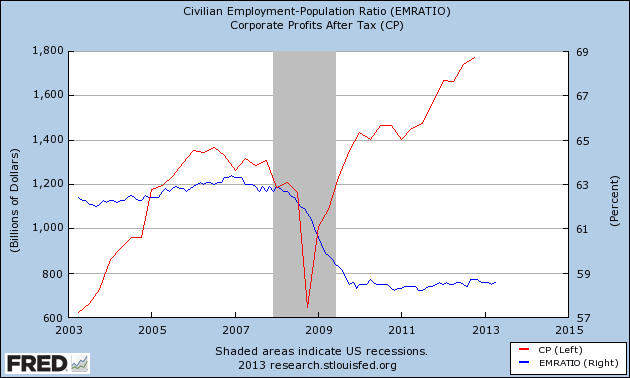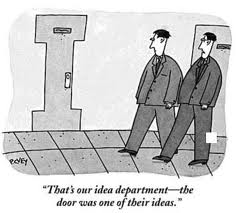Human Resources when there are less humans around
The below chart (or a version of it) has been making the rounds plenty in the last year or so as the American economy rebounds and seemingly continues to strengthen coming out of the financial crisis and ensuing recession of the late aughts.
It shows how despite corporate profits, expressed as a percentage of GDP, continuing to set records, that those record profits have not (taken in aggregate), translated into lots of new jobs, as the labor participation rate shows.
Source - FRED

As the chart pretty clearly shows, aggregate corporate profits (the red line), after plunging to a low at about the middle of the recession, late 2008, have rebounded considerably, and now are at all-time record levels as a percentage of GDP.
The employment rate however, after taking an equally dramatic fall throughout the entire recession, finally stabilized at a far lower level than pre-recession, and despite, (or some might argue what has been the primary driver of), rising corporate profits is showing no signs of regaining its former levels of around 62%.
Profits are up, way up even, yet corporations are achieving these profits with far fewer workers than before, (and paying them less, generally. We could also factor in wage growth or lack thereof to make that point at well).
There are lots of reasons for this - technological progress, increased automation, continuing reliance on relatively cheaper foreign labor, diminishing influence of labor unions, the aging of the workforce, etc. but the bottom line seems to be an ever-growing bottom line with less and less actual people needed to make that happen.
No doubt if you are one of the workers in the 'right' kind of job, you are probably doing pretty well or are on the way to doing pretty well. But if you are one of the people that might be in a field that has simply figured out to continue to drive profits without as many people, then things could be looking kind of grim.
Where does all this leave you as an HR/Talent pro?
A lot depend on the company/industry you are in. But in aggregate, certainly, when there are less and less 'humans' in the workforce, then corporations will figure out they need less and less Human Resources people to help look after them all. I have talked with a few HR leaders lately that are seeing both the size of their labor forces hold steady and their HR/EE ratios holding an extremely high levels.
Advice?
Make sure you are spending a decent chunk of your time and energy on things that are truly additive - technology that will help employees generate new ideas and innovations, marketing and recruiting strategies that will let you land more than your share of the best talent at the expense of your competitors, and even in an 'addition-by-subtraction' way, elimination of silly rules, policies, or processes that in any way get in the way of employee performance.
And you could spend some time figuring out what kinds of planning, services, training, development, and team building activities that 'resources' like our pal Baxter needs and you might ride this out a little longer.
Have a great weekend!

 Steve
Steve



